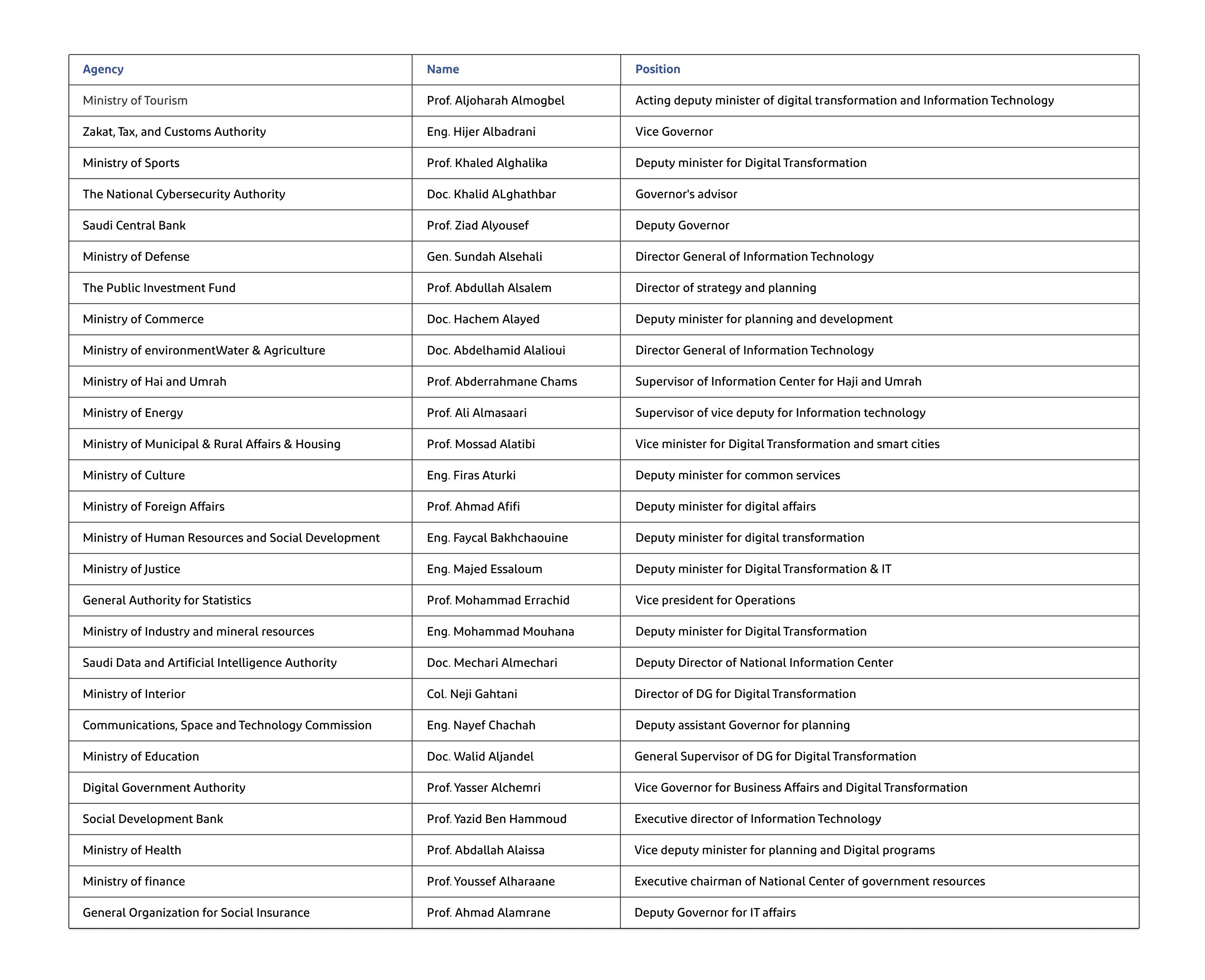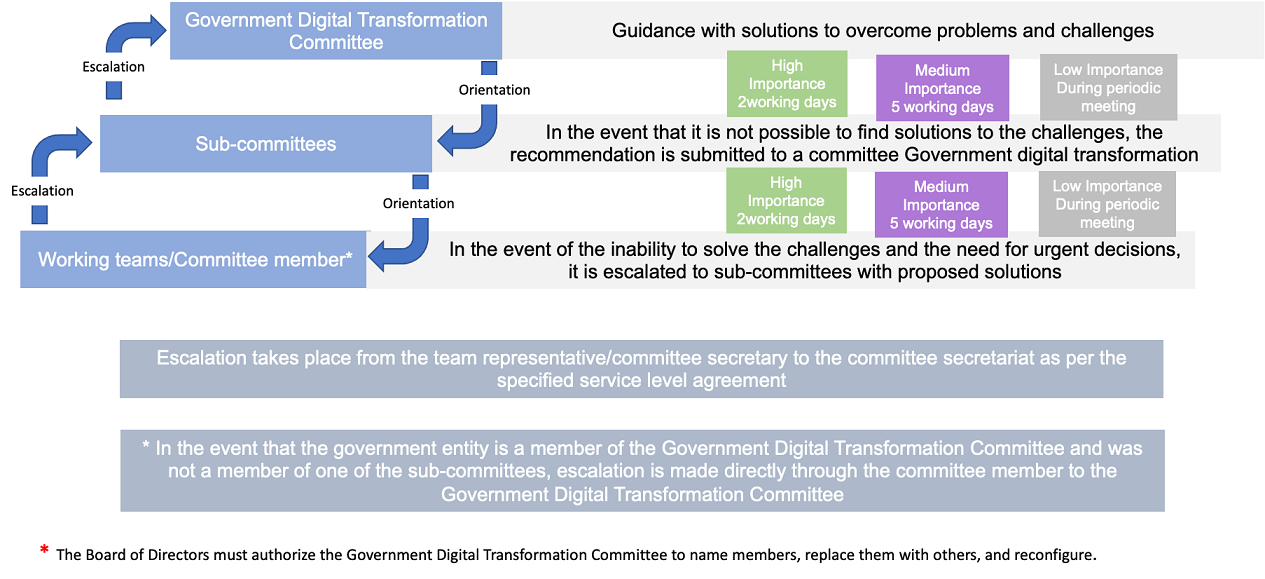Comments & Suggestions
For any inquiries or comments, please fill in the required information.
Loading...
Loading, please wait...
Digital governance ensures the effective and efficient implementation of digital transformation initiatives across government entities. This process is led by specialized authorities and coordinated efforts among national and international stakeholders. The collaborative governance framework aims to streamline digital services, enhance citizen satisfaction, and position the Kingdom as a leader in digital government innovation.
Share The Page
The Digital Government Authority (DGA) was established by the Council of Ministers under Resolution No. (418) dated 25/7/1442 AH in 2021. The DGA operates with legal, financial, and administrative independence, reporting directly to the Prime Minister. As the national authority overseeing digital government, the DGA's mandate includes regulating digital government operations, ensuring efficient service delivery, and fostering integration across government agencies.
Key responsibilities of the DGA include:
Aligning with international best practices, including the United Nations' Roadmap for Digital Cooperation.
The Governor of the DGA also serves as the Kingdom's Chief Information Officer (CIO). The CIO oversees the strategic planning, execution, and evaluation of digital government initiatives. With a background in technology leadership across public and private sectors, the CIO plays a pivotal role in ensuring that digital government projects align with national priorities and international benchmarks.

H.E. Eng. Ahmed Mohammed Alsuwaiyan
Governor of Digital Government Authority and Government CIO
His Excellency Eng. Ahmed bin Mohammed bin Ali Al-Soyyan has been the Governor and Board Member of the Digital Government Authority (DGA) since May 2021, leading Saudi Arabia's digital transformation efforts. His Excellency brings over 20 years of experience in the telecommunications, information technology, and financial sectors. H.E. Eng. Alsuwaiyan holds a Bachelor's degree in Computer Science and a Master's in Business Administration. His Excellency also chairs the Executive Committee of the Digital Cooperation Organization (DCO) and holds board memberships in prominent national organizations, including the National Center for Government Resource Systems (NCGR), the Saudi Business Center (SBC), and the National e-Learning Center (NELC). Additionally, H.E. is a member of the Board of Trustees of King Fahd National Library (KFNL).
Board of Directors of the Digital Government Authority
The DGA Board of Directors, chaired by the Minister of Communications and Information Technology (MCIT), comprises senior officials representing key ministries and authorities, including Commerce, Finance, Human Resources, and Social Development. Members include the Deputy Ministers of the Interior and Communications, as well as heads of SDAIA, the National Cybersecurity Authority, and other pivotal organizations.
The Digital Government Transformation Committee, established in 2021, focuses on harmonizing digital initiatives across government entities to achieve the objectives of the national Digital Government Strategy. Its responsibilities include:
The Committee also serves as the National CIO Network, comprising 27 high-ranking officials coordinating efforts across their respective agencies. The current members of the Committee include:

This network facilitates collaboration and addresses challenges through an escalation mechanism, ensuring the timely resolution of issues requiring higher-level intervention.
The President of SDAIA also serves as the Kingdom’s Government Chief Artificial Intelligence Officer (CAIO), responsible for shaping and overseeing the national AI agenda. The CAIO leads the strategic planning, execution, and evaluation of AI initiatives, ensuring their alignment with Saudi Arabia’s Vision 2030 and global AI governance standards.
As the principal authority on AI in the public sector, the CAIO coordinates AI adoption across government entities, establishes regulatory and ethical guidelines, and fosters collaboration between the public and private sectors. The CAIO also drives innovation by promoting AI research, talent development, and investment in emerging technologies, reinforcing Saudi Arabia’s position as a global leader in AI.
H.E. Prof. Abdullah bin Sharaf Alghamdi
President of Saudi Data & AI Authority and Government CAIO
His Excellency Prof. Abdullah bin Sharaf Alghamdi has been the President of the Saudi Data & AI Authority (SDAIA) at the rank of Minister, leading Saudi Arabia’s efforts in digital transformation. With over 30 years of experience, he has spearheaded major national initiatives, including the establishment of SDAIA, the development of the National Strategy for Data & AI (NSDAI), and the founding of the Saudi Federation for Cybersecurity, Programming, and Drones (SAFCSP).
H.E. Prof. Alghamdi holds a Ph.D. and M.Sc. in Computer Science (Distinction) from the University of Sheffield, UK, and a post-doctoral certificate in Web Engineering from the University of Ottawa, Canada. He attained a full professorship in Software Engineering in 2011 and served as a visiting professor at George Mason University, US.
His Excellency has held leadership roles at King Saud University, including Assistant Vice President for Knowledge Exchange and Technology Transfer. He has also served as a consultant and executive in global companies such as BAE Systems and IBM. In recognition of his contributions, he was awarded the King Abdulaziz Sash of the Second Class and the Moderation Award. He currently chairs the Board of Directors of the Saudi Company for Artificial Intelligence (SCAI).
Effective digital transformation requires seamless collaboration among various stakeholders, including government entities, private sector partners, and citizens. This coordination is achieved through strategic planning, task allocation, and stakeholder engagement. The DGA, Digital Government Transformation Committee, and National CIO Network ensure:
The digital governance framework also incorporates international collaboration, guided by the United Nations' Roadmap for Digital Cooperation.
The mandate of the Digital Government Transformation Committee also includes the establishment of an escalation mechanism. While most digital government-related projects and initiatives have been implemented without significant issues or challenges, some require intervention and guidance from the highest authority. This process facilitates intervention from higher authorities when needed, ensuring smooth implementation and resolution of complex issues. The escalation mechanism and procedure are presented below.

Numerous entities contribute to Saudi Arabia's digital transformation ecosystem, each bringing specialized expertise and resources. Key actors include:
These actors collaborate with the DGA and other stakeholders to advance Saudi Arabia's digital transformation journey, ensuring a holistic and integrated approach to governance.